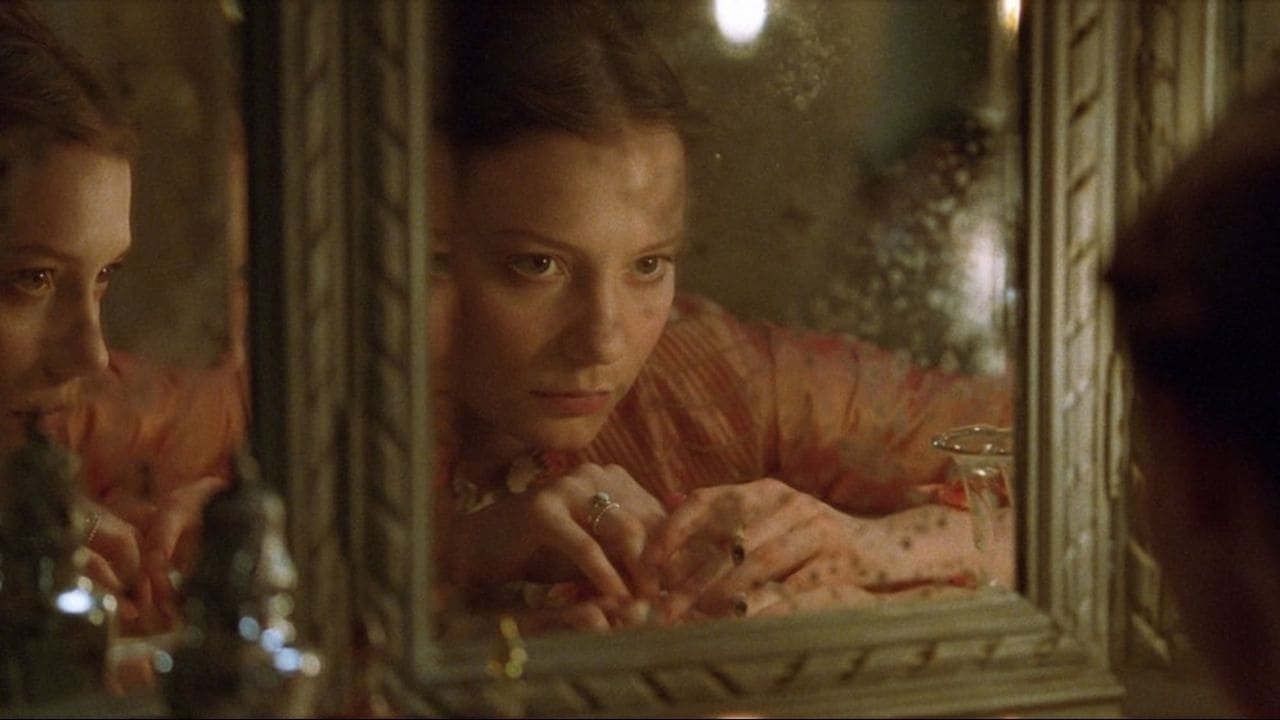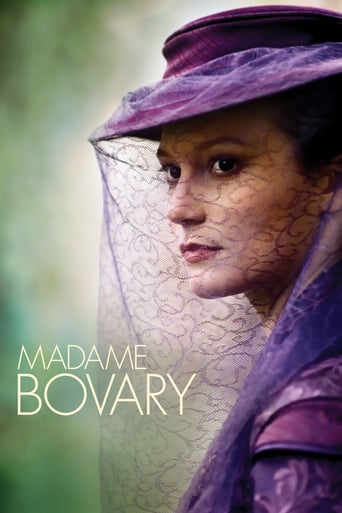2freensel
I saw this movie before reading any reviews, and I thought it was very funny. I was very surprised to see the overwhelmingly negative reviews this film received from critics.
Humbersi
The first must-see film of the year.
Tyreece Hulme
One of the best movies of the year! Incredible from the beginning to the end.
Phillipa
Strong acting helps the film overcome an uncertain premise and create characters that hold our attention absolutely.
marcioharker
Madame Bovary is an interesting movie with a good cast, but... It's not the kind of movie that I would be anxious to see again. Mia tries, but honestly, it feels like her character is not suitable to her, it lacks energy. The other actors are okay, but there's no one who really stands out or even a really charismatic character to you feel more empathy with exception maybe for Leon. My dear Ezra at first didn't convince me much, but soon his "delighted face" gets more appropriate to the naive, and reckless too, boy. The photograph is good, even with a shaky camera that can be really annoying sometimes, and the figurine (one of the only outstanding things here) is very good too, and it's really nice to see the beautiful landscapes. After all is an interesting movie, but not remarkable as it could be.
mkd002
Casting is totally off. Charles Bovary is supposed to be a large, good-natured, undemanding drudge of a man, hard-working and country bumpkin-ish without any slim, well-tailored glamour. Instead we get this svelte, firm, and resolute executive type with patent-leather hair. (Don't know if he ever did it, but the young Gerard Depardieu is the perfect physical type.) This is important because her spouse's rustic dullness as she perceives it has to be seen in the actor chosen. The Emma character has no obvious allure in this adaptation. Why are these men so attracted to her beyond an impression that she'd be "easy"? The whole plot involving Leon's legitimate reasons for visiting the house is mangled, as is the genesis of the attempt by Charles to correct Hippolyte's medical issue and the surgery's outcome. Boneheaded decisions abound, such as the decision to change the sumptuous, romantic ball that quickened Emma's economic and sensual envy into a grubby, sweaty stag hunt. Worst of all its many bad decisions, this film totally eliminates the Bovarys' baby daughter Berthe, whose existence is essential to our understanding of how huge the final tragedy really is and its domino effects far beyond Emma and Charles.I rarely write reviews but, when such violence is done to one of the great works of world literature, I do get annoyed. Apart from a bit of recognition for production values including cinematography, sets, location detail, costumes, I have to give this sloppy, bloodless and point-missing attempt the welcome it deserves.
Russ Matthews (russellingreviews)
"She wanted to die, but she also wanted to live in Paris." ― Gustave FlaubertWalking into the cinema... A classic novel by Gustave Flaubert that might be familiar to many by name only, but still sets the standard for realism. Emma Bovary has been portrayed by a multitude of actresses, but how will the perennial period actress, Mia Wasikowska (Alice in Wonderland) handle the disenchanted wife of Charles Bovary? Art-house rating: 2.5 stars* Cinematic rating: 2.5 stars Big question opportunities: 3 stars Review It is the name that might sound familiar, but this may be the first time this generation has engaged the story of Madame Bovary. Set in provincial 19th century northern France, Emma Bovary is a misunderstood soul who desires more than the small country town life style. She is beautiful and loved, but an enigma to most of the people who come into her life. Her father, the boarding school nuns and her husband, Dr. Charles Bovary (Henry Lloyd-Hughes) have an adoration for her, but do not know what to do with her wandering spirit. Her arranged marriage to the community physician, Charles, affords her a certain position within this small community's societal life. Soon she finds that this life as a doctor's wife, is not as glamorous as she thought and seeks satisfaction from her boredom. Emma finds solace in decorating her home, wearing the latest fashion and living out the romance she desires in the arms of other men. Eventually, overspending and the extra- marital relationships are all brought to light and Emma must come to terms with the repercussions of these revelations. Before dismissing this structure as a run of the mill romance novel, stop to consider that this classic tale provides something unexpected in literature. Gustave Flaubert's tragic tale explores the multiple layers of the feminine heart and what happens to someone when they painstakingly seek after the life that was not meant to be. A story chapter rich and laden with emotion. The key to a good film is a rich story. Madame Bovary provides just such a tale, but the implementation does not match the richness of the Flaubert novel. Sophie Barthes delivers a realistic view of 19th century France by depicting the look and feel of Emma Bovary's life as a societal lady in a small town. The landscapes and French countryside provide a canvas for Barthes to paint an emotional backdrop for her acting talent. Her direction delivers a masters class in effective visual delivery, but stumbles in with her casting choices. Leaving the comments about the multiplicity of accents to a minimum and focusing on the actors themselves. (Couldn't they have at least attempted a French lilt to their delivery?) The casting missteps came in the lead characters of Mia Wasikowska and Ezra Miller (The Perks of Being a Wallflower). Wasikowska has proved her skills in portraying women of this era in Jane Eyre, but she does not have the commanding presence to play the emotional layers and sensuality of Emma Bovary. She continues to prove herself as an actress, but does not rise to the challenge of this iconic literary figure. Similarly, Ezra Miller is a striking young man, but was woefully miscast. He does not have a commanding presence on the screen and comes off like a love-sick school boy throughout the film. These central characters let Barthes' direction down and ultimately fail to provide a satisfactory experience. Paul Giamatti and Henry Lloyd-Hughes should get a nod as under- utilised talent, but the support characters cannot make up for the leads. If Barthes does redeem herself in choosing talent it was with the casting of Rhys Ifans (Sherlock) as the devious Monsieur Lheureux. He has the ability to sweep into each scene and convince Madame Bovary and the audience that he is an ally, but proves to be the unassuming villain. Barthes provides a beautiful backdrop for her portrait of Madame Bovary, but neglected to find the right individuals to complement the cinematic canvas.Flaubert was known to be artistic with his words and even in this less than effect interpretation of his novel, the tragedy that is Madame Bovary draws the audience into this captivating, fictitious world. How this man was able to deliver a story that seems to capture the heart of the dissatisfied woman is amazing to consider. His story shows us how easy it is to miss out on what is important in this life. Flaubert provides a multitude of entry points into the considerations for envy, satisfaction and contentedness. Showing that when striving to find satisfaction in mere things or people, they will ultimately fail to provide the answers that exist beyond this life. It is unfortunate that the cinematic experience could not match the richness of the original story, but even in this weak delivery, the story of Madame Bovary does allow for engagement and contemplation of the bigger ideas of life.Leaving the cinema... How do you take on a classic like Madame Bovary? Sophie Barthes has the skills as a director, but does not seem up to the challenge of taking on Flaubert's novel. It was a credible attempt, but ultimately forgettable. Reel Dialogue: What are the bigger questions to consider from this film? 1. Why is love essential to life? (Matthew 22:26-40, 1 Corinthians 13) 2. Can we find redemption for our lives? (Ephesians 1:7, Colossians 1:14) 3. What should we do with the boring parts of life? (Ecclesiastes 2:24-26, Proverbs 19:15)Written by Russell Matthews based on a five star rating system @ Russelling Reviews #russellingreviews #madamebovary
quayrice
First, the short summary at the top of the IMDb page COMPLETELY MISREPRESENTS the plot of the movie and novel. Madame Bovary is not simply cheating on her husband to advance her social status.Her affairs are part of a much more profound struggle for transcendence from the ordinary life in which she feels trapped. That's why the novel is a classic of modern literature. The way IMDb puts it makes it sound like a cheap Lifetime movie.Second, Mia Wasikowska is a fine actress but I've always imagined Madame Bovary as a much more sensual woman.Third, I think Ezra Miller was terribly miscast as Leon Dupuis. Not to disparage his acting, but he's far too young and effeminate to be an object of desire for Emma Bovary.While the film was beautifully shot, it otherwise doesn't quite do justice to Flaubert. Perhaps my expectations were too high.

